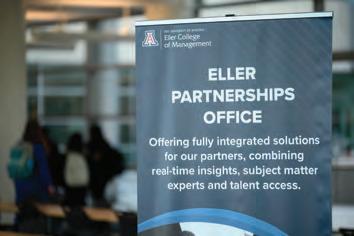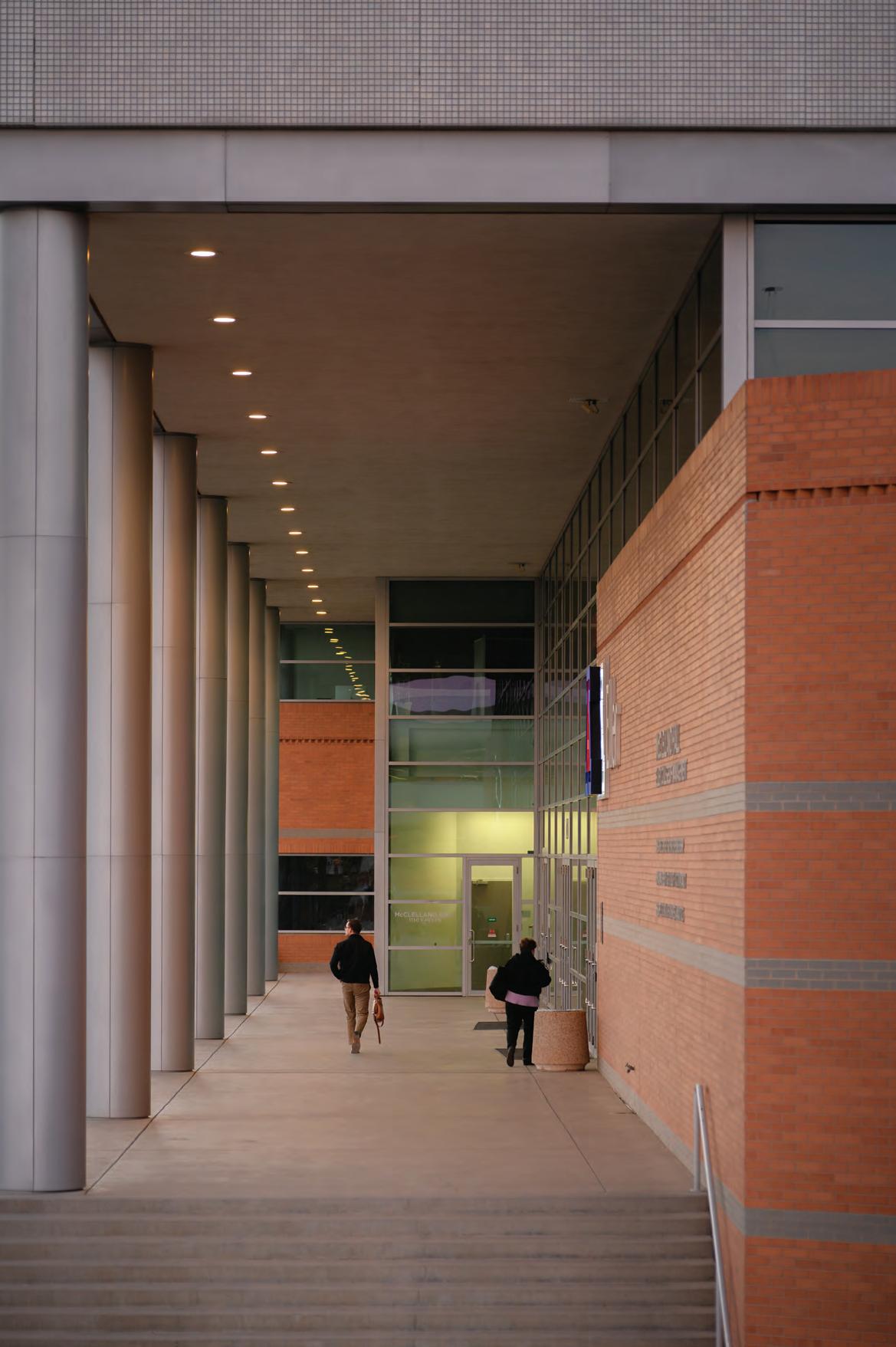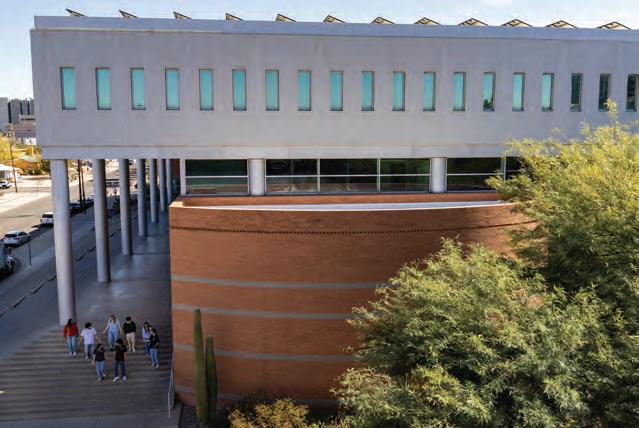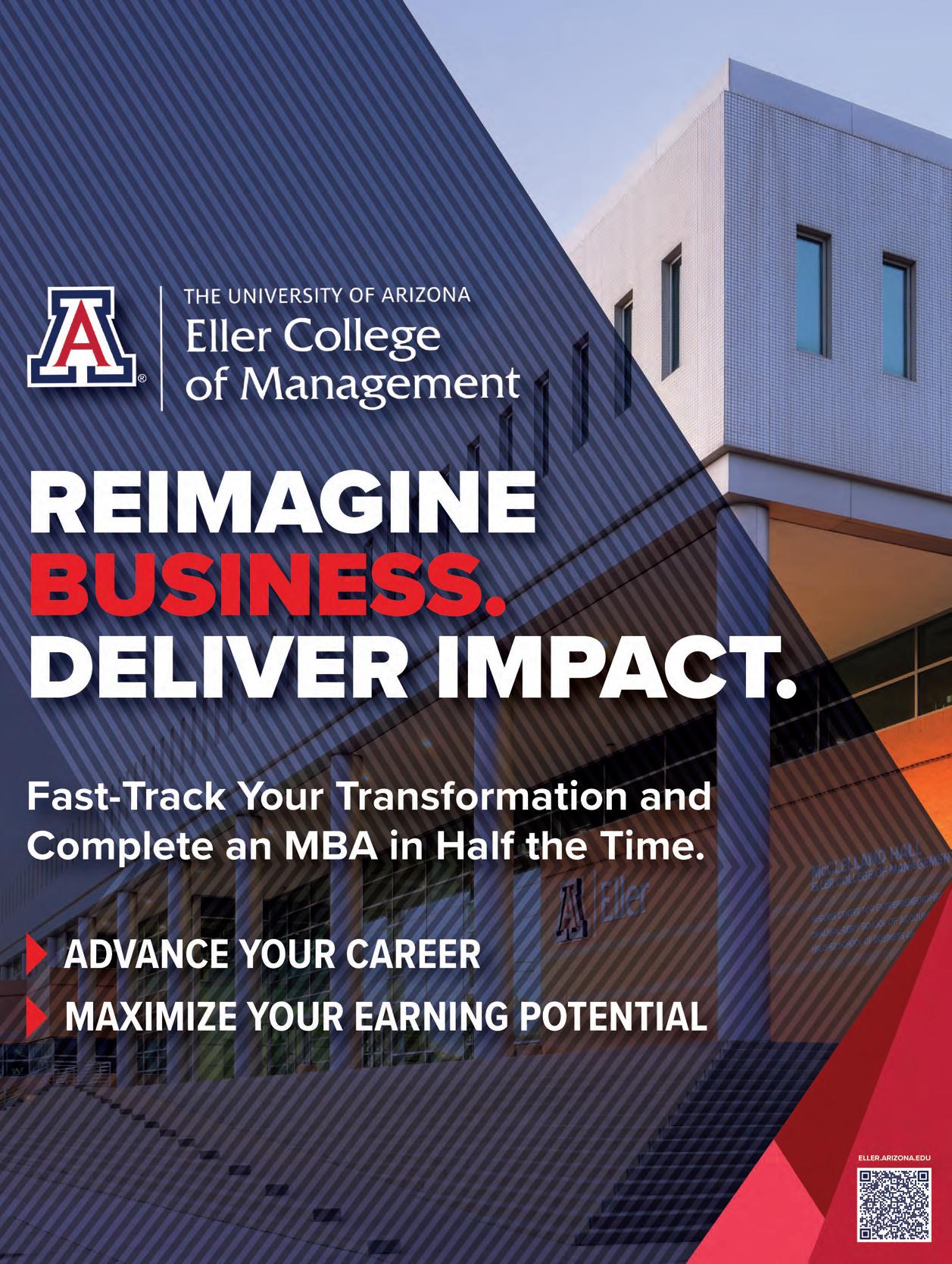The University of Arizona Eller College of Management

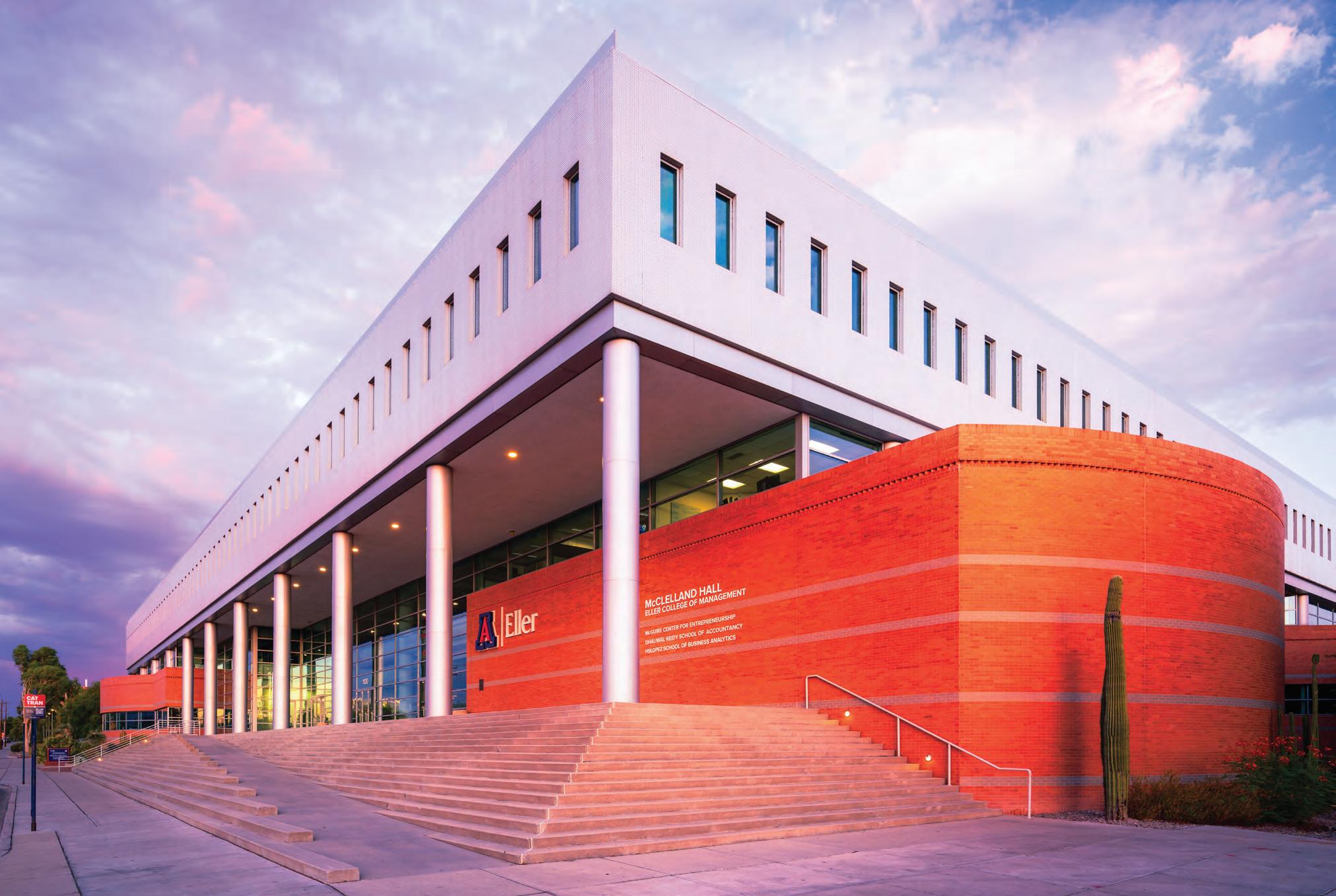

Karthik Kannan
Dean and Halle Chair in Leadership
Eller College of Management
The University of Arizona
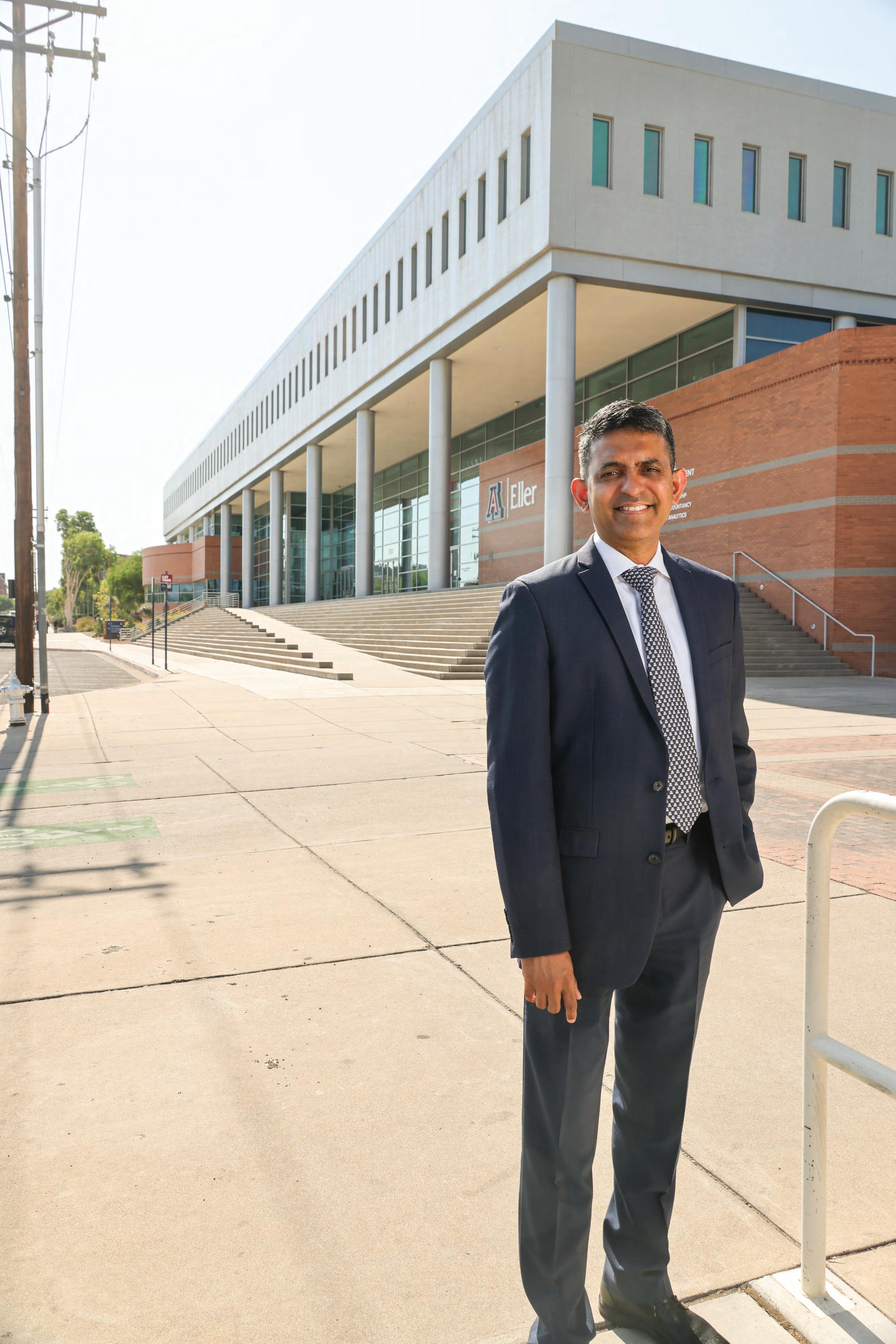






Karthik Kannan
Dean and Halle Chair in Leadership
Eller College of Management
The University of Arizona



By Dave Perry
“Eller.”
The word stands alone next to the block “A” on McClelland Hall, along Helen Street on the University of Arizona’s north end.
Say “Eller,” and leaders in business, industry, and education know what you’re talking about. Yet few understand the full breadth, reach, and impact of the Eller College of Management.
Dean and Halle Chair in Leadership Karthik Kannan is deepening awareness of Eller’s might, within the college itself, across the U of A campus, and certainly across Arizona, the nation, and the world.
His goal is to keep Eller “among the world’s premier business schools.”
“Eller has always been, and will continue to be, shaping business through education, impact, and research,” said Kannan, who took the helm at Eller in 2022. “There are spectacular things happening within Eller.”
Kannan—a distinguished researcher who has authored numerous published papers—leverages enthusiasm and creativity, backed by academic credentials and experience in private industry, in his role at Eller. As a trailblazer in digital transformations, analysis of digital traces and strategic foresight, he utilizes analytical and entrepreneurial skills to implement programs that prime Eller students for success.
“Dean Kannan has really changed the trajectory of the college,” said Anastasiya Ghosh, Ph.D., associate professor of marketing and associate dean of partnerships at Eller.
He’s done so by “building collaboration outside of Eller, within the univer-
sity and other colleges, as well as with external entities in business and industry,” Ghosh said. “Our work has impact that goes beyond the walls of our school.”
Industry and community collaborations are key components of Kannan’s philosophy to propel students into the future.
“While Eller may have been more insular in the past, Karthik has actively fostered deeper connections both within the university and with the greater Tucson community,” agreed Pamela Jorden, Ph.D., assistant dean of Eller graduate programs.
Jorden cited Eller participation in Tucson’s “40 Under 40” event celebrating emerging leaders and “Professionals Who Shine,” which honors regional leaders. Kannan has also championed creation of dual-degree programs between Eller and other U of A colleges such as Engineering and the College of Medicine—a “unique endeavor at many universities—as well as the development of Eller-led multidisciplinary teams through the Eller Partnerships Office that collaborate with local businesses to address real-world problems.
Jill German, head of Roche Tissue Diagnostics, credits Kannan’s leadership with creating “an entrepreneurial ecosystem where students help companies solve real-world challenges while preparing for their roles as the next generation of civic and business leaders.
“That’s how you build a competitive local economy and a resilient community.”
First, ‘We produce students’ For Kannan, and Eller, it all begins with students.
Eller is among the U of A’s largest
colleges, with 8,100 undergraduate students, 1,300 graduate students, 24 academic programs, and more than 130 world-caliber faculty members.
Eller now offers 18 graduate programs. Latest to the portfolio are Master of Science degrees in Artificial Intelligence, Online Marketing and Economics degrees, and a streamlined, OneYear MBA. These programs exemplify Eller’s commitment to an innovative, digital-first strategy that makes its programs accessible to students worldwide.
“We took a bold step - one that reflects both innovation and adaptability - by launching four new graduate programs,” Jorden said. “These offerings represent a strategic pivot toward flexible, market-driven, and streamlined education at a time when professionals are actively seeking faster, more accessible ways to upskill.”
“The future of business is going to be about technology,” Kannan said. “We must equip our students” with technical and analytical skills “so they excel in research, business, and community.”
The three ‘R’s at Eller
“Our strategic priorities are Reputation, Rankings, and Resources,” Kannan said. “Excellence in all three elevates our prominence and impact.”
Eller certainly has the academic reputation: Among many top national rankings, its management information systems graduate program is rated among the nation’s top three best public university offerings of its kind according to U.S. News & World Report
Post-graduation, Eller alumni are “impacting their communities for good,” said Kannan. “We compete with institutions that have far greater resources, yet our alumni consistently
continued on page 81 >>>
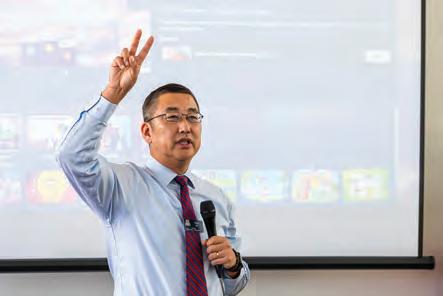
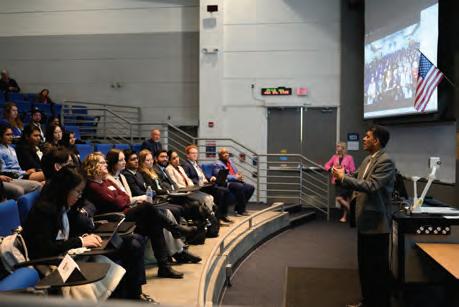
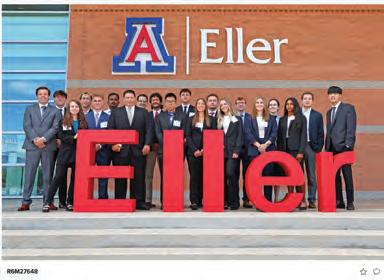
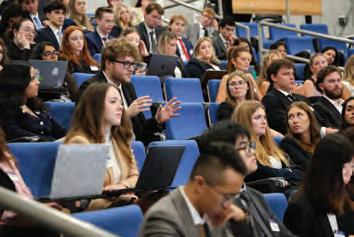
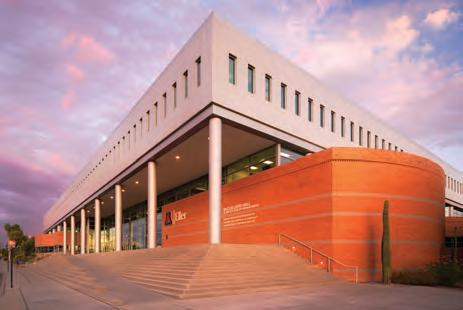
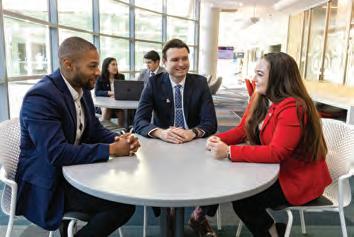
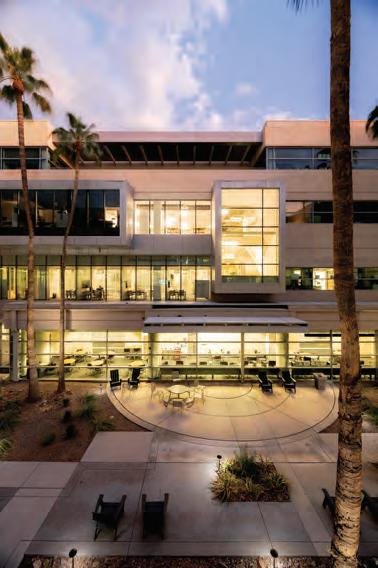

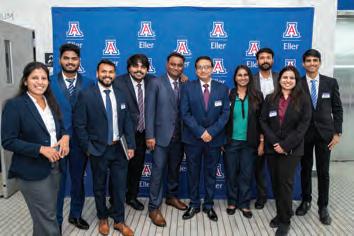
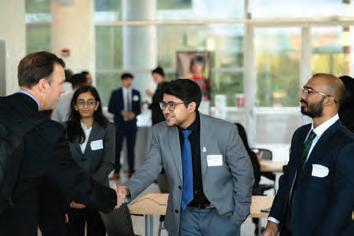
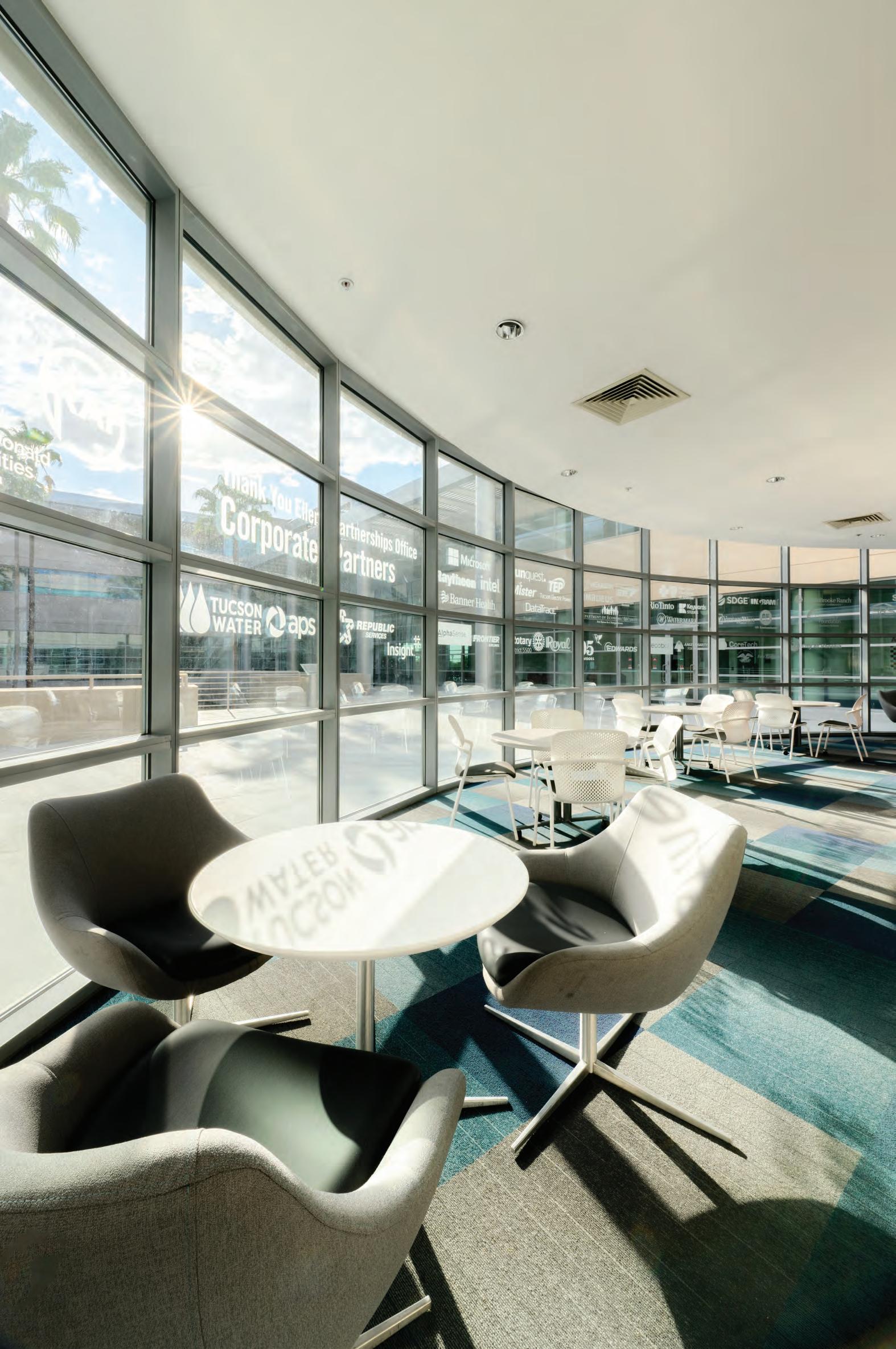




By Dave Perry


Artificial Intelligence is “the talk of the town,” according to The University of Arizona Eller College of Management Dean and Halle Chair in Leadership Karthik Kannan.
In fact, AI has been the talk of Tucson for 36 years, dating back to the founding of Eller’s Artificial Intelligence Laboratory in 1989 by U of A Regents’ Professor of MIS Hsinchun Chen. The visionary endeavor was the world’s first AI lab or center within a business school, and Eller remains at the forefront of AI business education with the recently launched Online Master of Science in AI for Business — one of four new Eller master’s degrees enrolling students for fall 2025.
“Eller is reinforcing its position as a leader in innovative business education,” Kannan said. “It is our ongoing mission to provide real-world education and present high-level opportunities for our students. We’re set up right for impacting society.”
Each of the four new programs the Master of Science in AI for Business; the streamlined One-Year MBA; the Online Master of Science in Economics; and Online Master of Science in Marketing offers immersive learning experiences with the U of A’s world-class faculty along with cutting-edge information, technology and research from the college rooted in more than a century of tradition.
Graduate students, who can access one-on-one guidance and career management resources from Eller’s Graduate Professional Development Center and real-world industry ex-
periences through Eller’s Partnerships Office, have six-figure earning potential. They also forge connections with a network of more than 300,000 alumni across 150 countries.
To accommodate busy people who need to keep earning while learning, three of the programs are 100% online and asynchronous, giving students flexible, high-quality options to attain their master’s degrees.
“People don’t want to take time off from their careers and spend the number of hours they’re spending in the classroom,” Kannan said. “This is a way to get access to that degree without giving up that income stream or time with their kids, and to better their lives for the future.”
Eller is intentionally meeting students where they are, according to Patricia Prelock, provost and chief academic officer at the U of A.
“The expansion of Eller’s graduate portfolio exemplifies how the University of Arizona is reimagining professional education for the digital age. These programs... represent a strategic expansion that aligns with workforce demands and student needs.”
The new programs reflect the realities of a fast-paced, remote-friendly world, according to Pamela Jorden, Ph.D., assistant dean of Eller graduate programs.
“While accelerated and online degrees aren’t new, the decision to offer a condensed MBA alongside specialized online master’s programs
signals a deeper institutional shift,” said Jorden.
“It acknowledges that traditional, two-year, on-campus models no longer meet the needs of every learner—particularly working professionals and career changers. This move is also driven by a highly competitive graduate education landscape and the growing need for universities to respond more quickly to industry demands.”
The instructional design utilized in the new programming provides students with the highest quality of education— as demonstrated by Eller’s nationally recognized programming including the No. 3-ranked public Online Master’s in Cybersecurity; No. 3-ranked public Online MIS; and No. 7-ranked public Online MBA according to U.S. News & World Report.
“With today’s technological advancements, interactive platforms, and real-time faculty engagement, online programs can match—or even exceed the engagement levels of traditional classrooms,” Jorden said.
The changes in education segue with innovation in industry, according to Susan Gray, CEO of Tucson Electric Power and chair of the board of The Chamber of Southern Arizona.
“Our industry is not the only one undergoing incredible transformation. Amid accelerating innovation, evolving customer expectations, the digital revolution and other factors, companies are reimagining tradi-
continued on page 72 >>>

By Dave Perry
From Sunday evening to 10 p.m. on Friday, without pause, the warehouse at Roche Tissue Diagnostics (RTD) in Oro Valley is humming.
In a given week, large quantities of empty large plastic bottles, dispenser parts, vessels of fluid and truckloads filled with pallets, cardboard boxes and spools of clear-plastic wrap funnel through one truck bay in the RTD warehouse space.
Ideally, materials sit in the warehouse for mere minutes to optimize production and distribution of life-saving cancer diagnostic solutions bound for Indianapolis and Mannheim, Germany. An interdisciplinary team from the University of Arizona Eller College of Management Partnerships Office (EPO) is helping to expedite that process.
In 2024, Roche entered a two-semester partnership with Eller’s Immersion Learning Projects program to analyze and solve costly warehouse bottlenecks. The program is one of numerous collaborations facilitated by the EPO with businesses in Tucson, Phoenix and beyond to solve real-world problems for its partners. Launched in 2023, the EPO is helping transform workforce development and boost economic prosperity for local and regional economies. Partnership projects typically span one semester or an academic year.
“The Eller Partnerships Office is a conduit between the college and the university and our industry and community partners,” said Anastasiya Ghosh, Ph.D., associate dean of partnerships with Eller.
“The goal is to solve an in-demand industry problem by leveraging our amazing students and faculty and to make sure that our students are workforce ready and are receiving relevant, timely knowledge about their disci-
plines and how to work in different roles in cor porate America. These projects also provide real value to our partners.”
The impact has been significant for RTD, which was challenged with efficiently moving materials and finished products through the warehouse to “optimally utilize the space for growing business needs,” according to Himanshu Parikh, Ph.D., Roche’s VP of global operations.
He emphasized that “the slightest delay” can wreak havoc.
Enter the Eller consulting team led by Mohammed Shafae, professor in the U of A College of Engineering. Eller students Ximena Peregrino, Cole Hansen, Julie Amato, Noureen Mithaigar, and Eleni Canez were tasked with creation of a 3D model of the warehouse using the software Simio to “visually digitalize and reorganize” the space.
The investment paid quick dividends: Students designed a staggered schedule for deliveries and product shipping so that overlap is minimized, flow is maximized and money is saved.
“To listen to them ... is very refreshing and exciting,” Parikh said of the students. “They have a different perspective which helps us to look at things differently.”
“These are very digitally savvy students teaching us about the software,” said Lansing Redford, Roche lead data analyst and project leader.
“The EPO program is extremely business-friendly. Their attitude is, ‘Let’s figure it out.’”
The 3D model enables Roche to study different possible configurations to move materials, finished products and people.
Simio “doesn’t give us theories; it lets us test theories,” Redford said.
“We can poke it, twist it, change it, without additional cost,” Parikh said. “You can do all the manifestations digitally. We can visualize them and then evaluate, ‘Did we get the expected result?’”
With warehouse flow optimized, RTD can grow its business up to 8% a year without adding more space.
There are practical future considerations for RTD, which plans to continue working with Eller graduate students to create a digital model for the entire factory.
Parikh added the importance of this partnership being local to Tucson: “It makes a huge difference.”
RTD Head Jill German categorizes the partnership as a win-win for everyone involved and encourages other businesses to take full advantage of resources offered by Eller.
“The project led to tangible improvements in our manufacturing workflow processes and outputs, which ultimately affects our ability to impact customers. Students in the program get good experience in solving the real-world business problems we have, while we receive benefits from their innovative viewpoints, and maybe solutions we haven’t thought of,” German said.
“Eller then becomes a source of innovation and practical problem-solving. We built on their unique skills to move our processes forward.”
The Eller Partnerships Office works with 88 companies of all sizes from diverse sectors on experiential projects involving 28 faculty and 141 students. The office has experienced 188% year-
continued on page 75 >>>
From left –Sandhya Rangaswamy; Anastasiya Ghosh, Ph.D., associate dean of partnerships with Eller; Bailey Lloyd, associate director of corporate partnerships for Eller
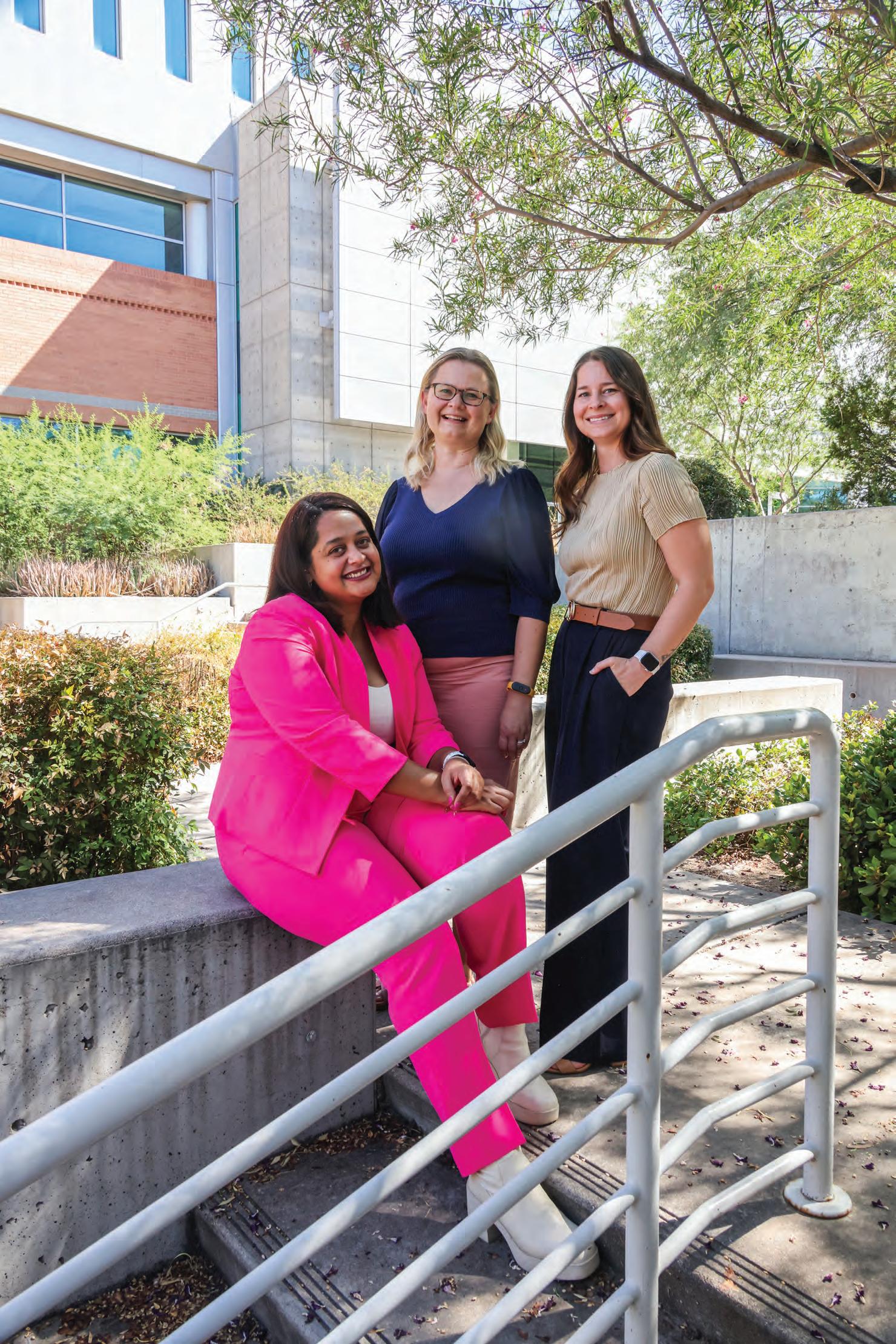


over-year growth and has generated $2.2 million in revenue for the U of A since its inception in 2023. Partnerships in Tucson and Phoenix have been formed with companies in diverse sectors including semiconductors; airlines; data analytics; energy and utilities; aerospace and defense; healthcare; retail; consumer goods; entertainment; mining; nonprofits and more.
Other EPO offerings include the Consortium for Environmentally Resilient Businesses, a collaboration between the academic, business and regulatory communities that focuses on climate change challenges, sustainable business practices and energy consumption.
Utilities companies from Arizona and California compose the hub of the consortium, which works with academics and students to advance knowledge, develop the next generation of leaders and improve policy regulation.
“The consortium is an opportunity for our students to provide consulting for a group of companies in our communities that share common challenges and come together to pool their resources—not only money, but data and knowledge—to produce better outcomes,” said Ghosh.
Consortiums and consulting projects are transforming traditional graduate education and creating unique ports of entry for students to learn in real time, according to Bailey Lloyd, associate director of corporate partnerships for Eller. Students apply technical skills in a non-classroom setting and attain crucial soft skills in communication, teamwork, resilience and management.
“These experiences are invaluable to our students and are a great resource and asset to our partner companies. They help our students to be as successful as possible and to show what they have learned, how to apply it, and how to make real change in an organization,” said Lloyd.
Raytheon, an RTX business unit, has experienced that value firsthand, according to Mark Edmondson, senior solutions architect with Raytheon. An Eller alum with a Master of Science in MIS, Edmondson is the Raytheon liaison for the Eller Immersion Learning Projects. He has worked on a variety of
projects directly with student teams including blockchain; democratized data; alternative business value for portfolio management; and leveraging lightweight 3D digital models (digital twins) to accelerate the business.
He credits the teams with “fitting in a niche that provides the same quality of research and work as a consulting firm.” Their efforts have had a measurable impact in Raytheon strategic investments.
“Raytheon is always evaluating our technology portfolio and refining our capability roadmaps and Eller students provide us with thousands of research hours to refine those roadmaps that would not be possible otherwise,” said Edmondson.
Immersion projects and consortiums also keep companies and students abreast of emerging trends and alternative business approaches while promoting idea exchange. Additionally, they aid with talent acquisition in an era when hiring has become challenging for potential employees and employers alike.
“It is hard to discriminate real talent from someone who ran it through an AI profile creator and businesses are using similar profiles. . .it has become a war of AI profile creators for jobs and potential new hires. . .and working with Eller students is a great way to combat that,” Edmondson said.
In addition to imparting workforce readiness skills in management, coordination and leadership, the hands-on experiences can net student internships or permanent employment.
Roche retained Mithaigar, a Master’s in MIS candidate, as a summer intern to “fine tune” the warehouse model while earning a final credit toward her degree.
“It was a transformative experience. I contributed to a real-world manufacturing optimization project alongside a talented team of University of Arizona students,” Mithaigar said.
“This experience has elevated my understanding of warehouse operations, data-driven decision-making, and simulation modeling. I’m excited for what’s next.”
Sandhya Rangaswamy, who completed undergraduate studies in chemistry at the University of Delhi and is a 2026 candidate for a dual Master of Science in Business Analytics/Master of Science in MIS, has doubled down on consulting projects. Her experiences with Banner Health and Roche “created situations where people from different majors all came together as one team, one mind, which was both interesting and challenging.”
Rangaswamy said the projects provide excellent workforce preparation on every level.
“They help you shape yourself for the future, building the adaptability to work effectively with different people and circumstances. Here, you can experiment with techniques you might not get to try in the real world, and you have the upper guidance of professors through the Partnerships program—it’s like a guiding light.”
In the highly technical business environment facing graduates today, handson job training and development of soft skills communication, resilience, teamwork— are imperative, according to Ghosh.
“Our program essentially takes onthe-job training in-house, which reduces the risk for companies. . . because they can preview the talent, and it prepares students to be workforce ready on day one,” said Ghosh.
Ultimately, the EPO is strategically building U of A/business relationships that benefit the city, region, state and beyond.
“The University of Arizona has long been a resource for remaining on the cutting edge and Eller is a prime example of that,” said Edmondson.
“The Tucson business community and U of A are joined at the hip in a mutually beneficial relationship. The Eller Partnerships Office is one of the best ways to lean into that relationship and ensure that Tucson is not just a pitstop for higher education but actually a destination for careers.”
Businesses interested in prospective partnerships with the EPO can learn more at https://eller.arizona.edu/engage/ partnerships-office.
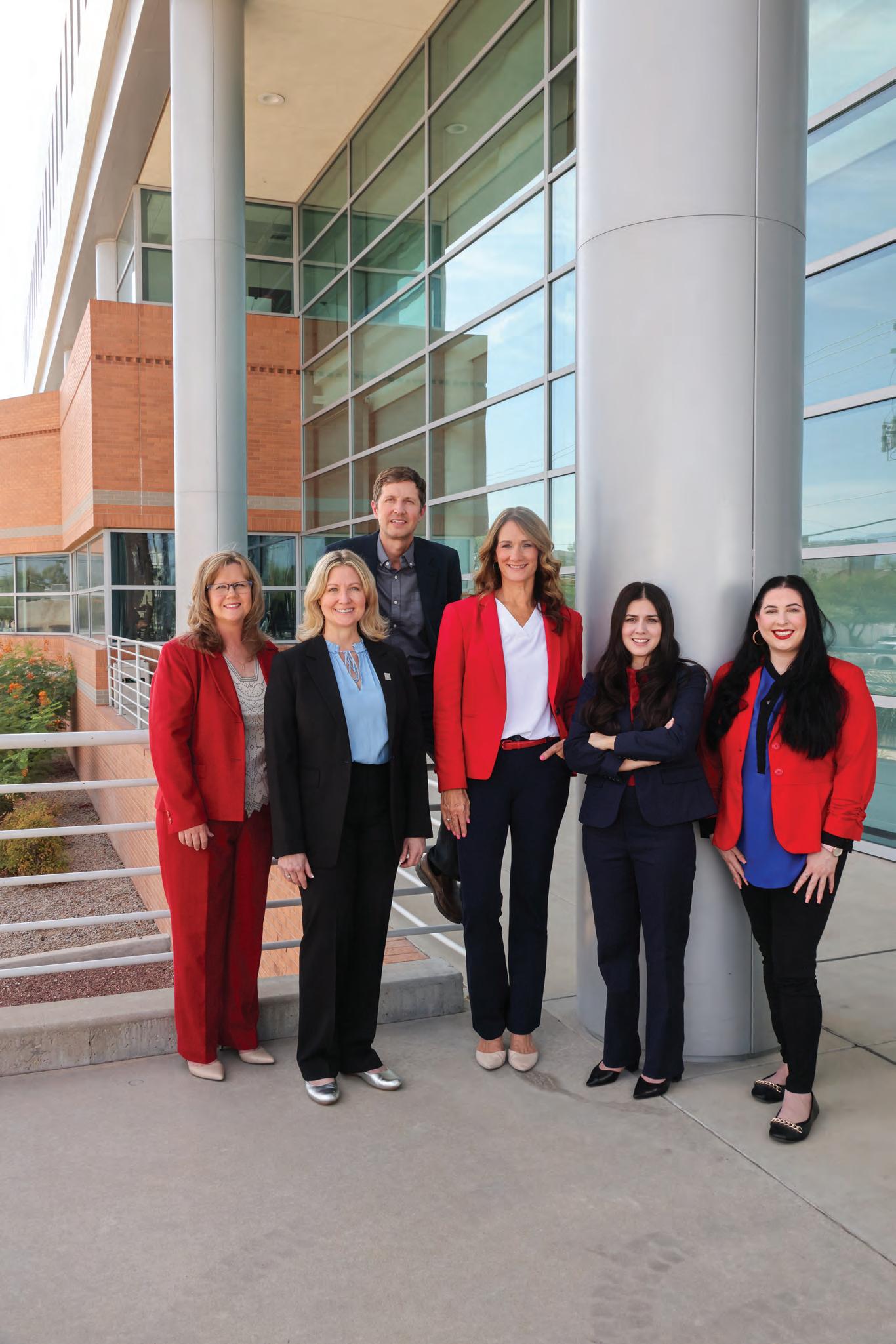


By Loni Nannini
The Graduate Professional Development Center at the Eller College of Management uses collaboration, innovation and technology to optimize student return on investment by teaching the business—and art—of career management.
“Career management is a learned skill. We teach competencies that are lifelong lessons; if students learn these skills now, they will take them with them forever as they pivot in the future,” said Wendy Wienhoff, director of the Graduate Professional Development Center (GPDC).
Launched in 2024 in the increasingly complex job market, the center offers a centralized hub for services and support including career counseling; assistance with creation and review of resumes, CVs and cover letters; job search assistance including access to job boards, internship searches and interview preparation. It also stages career fairs and seminars to maximize professional readiness and promote industry connections. Guest speakers and workshops focus on topics such as negotiation, LinkedIn optimization and industry-specific paths. Services are open to current students and alumni.
The flagship professional development center is Eller’s response to unprecedented demand for the professional development and career coaching markets, which are projected by DataHorizzon Research to grow to
a combined $100 billion-plus industry by 2033.
Understanding the entire process of searching for a job—and associated skills such as presenting oneself professionally, navigating workplace culture, effective communication and networking—are essentially a “hidden curriculum” that the GPDC seeks to demystify, according to Wienhoff.
“We are here to support students with the end goal of finding employment. It is a 40-hour-a-week job to search for a job and we want to help students do it as effectively as possible,” said Wienhoff.
Wienhoff and her team of seasoned career coaches combine a personalized, hands-on approach with information about the strategic aspects of career management—different tactics used by employers; how job application tracking systems work; AI and platforms such as Jobscan and Interstride; techniques to differentiate resumes; and more. This comprehensive strategy is a huge advantage at Eller that many universities don’t prioritize, according to Wienhoff.
Prioritizing professional development is essential for students to compete in today’s ultra-competitive employment environment, according to Melissa Poole, senior associate director of the GPDC.
“We are a high-level connection point for students. They have the expectation that we will connect them not only to the foundational learning they need for
job searches, but provide opportunities for them to make employer and alumni connections. These connections can help them find their value and market that value effectively,” said Poole.
The GPDC embraces a multipronged approach to career management that integrates curriculum and resources across different platforms with coaching, mentoring and networking.
To jump-start the process, a firstterm career planning course, Career Management, has been incorporated as a mandatory element of core graduate curriculum at Eller.
“Students feel like they can do career planning after they graduate, but that is almost too late. We want to engage them while they are in the program. Graduate level programs are rigorous and time management is really important, and if anything is going to be pushed aside, it is the career search. We want to bring the career component to the forefront,” said Wienhoff.
The course covers everything from “How to Find a Job 101” and “Resumes and Cover Letters” to personal branding and networking, along with interview techniques and the technical aspects of tailoring cover letters and resumes to AI criteria.
continued on page 78 >>>

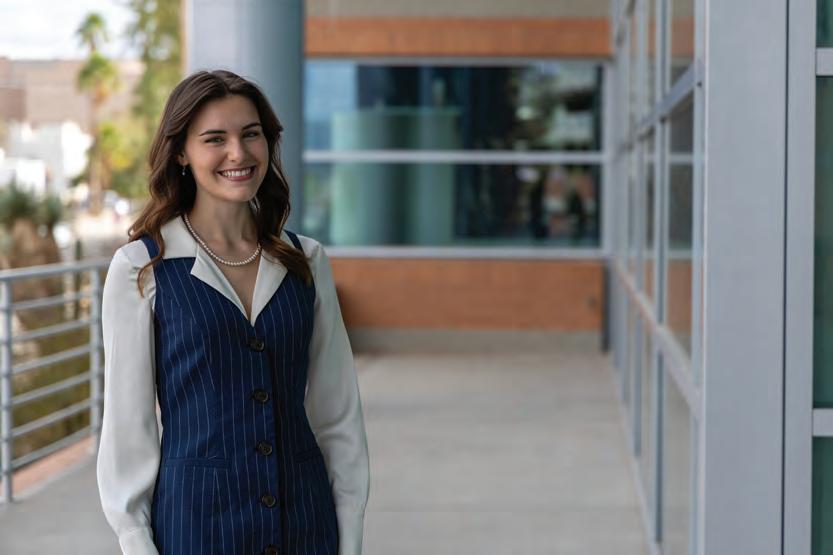
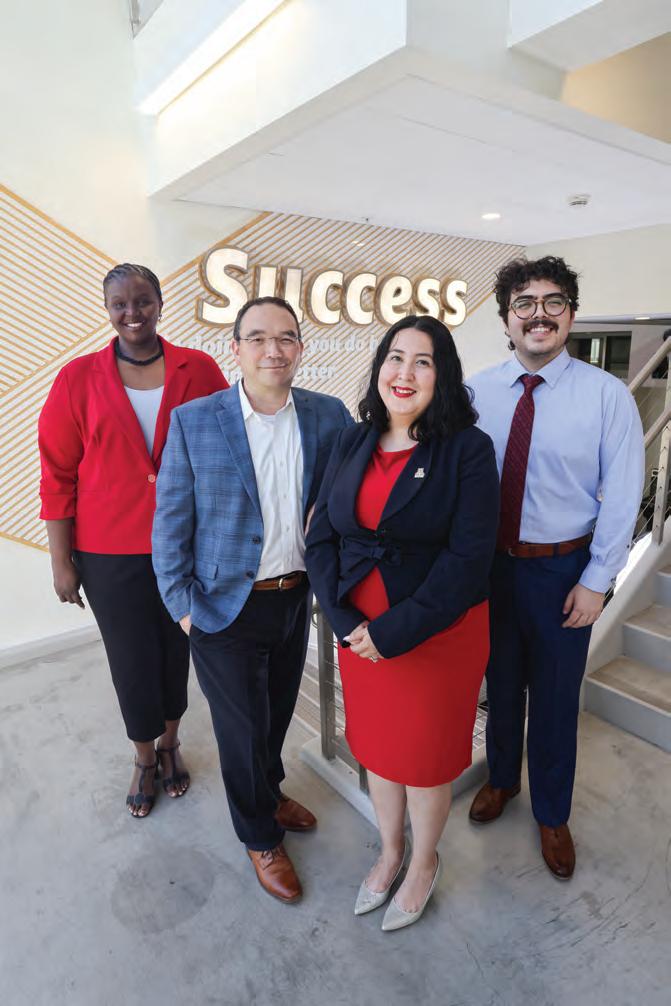
By Loni Nannini
For Trinnie and Matthew Cortez, an MBA from the Eller College of Management is all in the family.
The father-son duo have simultaneously pursued their advance degrees at Eller: Trinnie is a 2026 Executive MBA candidate and Matthew completed a dual Master’s in Accounting/MBA with a concentration in business analytics in 2025.
They exemplify the diverse ages, backgrounds, cultures and academic disciplines that make up the Eller grad family.
“I applied for my Master of Science in Accounting, and it was under the influence of better judgement—being my parents—that I decided to apply for my MBA as well,” said Matthew, 25, a firstgeneration Eller grad who earned his bachelor’s in accounting in 2022 along with a bachelor’s in music.
That decision has paid dividends. Matthew gained better understanding of the operations and context of a business and his specialization in business analytics equipped him “to participate at a better level” as an analyst with the
Financial Forensics and Valuation Services team at BeachFleischman.
“It is the cross-section of accounting and finance; it’s analysis and report preparation for expert testimony that can be used in the court of law. This could be the valuation of companies, asset misappropriation, partner dispute analysis, divorce consulting, or computations for economic damages. It is everything and more than I could have asked for,” said Matthew, now a C.P.A. candidate.
continued on page 80 >>>

